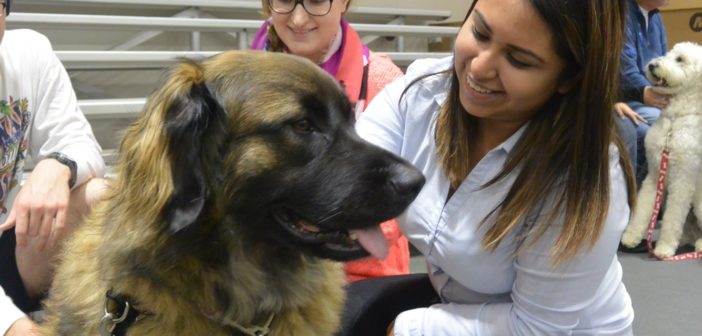Since its introduction three years ago, Dyson Dog Days has provided substantial and widespread relief for North Central’s student body. Each term, in weeks 5 and 10, the Dyson Wellness Center sets up a small area in the Res/Rec arena and invites therapy dog owners to come by for two hours. The dogs are incredibly popular, but how are they capable of enduring the flood of students, noise, and petting, for so long?
All the dogs that attend these Dog Days are properly trained; they receive certifications as official therapy dogs, after passing several tests and training sessions that focus on behaving a specific way.
Given that being a therapy dog calls for a calm demeanor, a few select breeds may come to mind. However, many of the owners present at this term’s first Dog Day, Oct. 13, say that’s not the case.
“All kinds of dogs can be therapy dogs; big, small, male or female,” said Jessica Majersky, owner of a 7-year-old Great Dane named Lucy.
There are certainly some breeds that are better suited for the therapy life however; dogs that are more easily trained, less protective, and less hyper, tend to be favored for the role.
Liz Mishima, a therapy dog owner for 15 years and professional dog trainer prior to that, talked about which dogs are preferred, using her 3-year-old Leonberger, Daisy, as an example.
“They’re (Leonbergers) known for this kind of temperament; very mild, easygoing,” said Mishima, commenting on how calm Daisy was remaining, despite the dozen students surrounding her. “Dogs that are easy to train make great therapy dogs; I had two German Shepherds before Daisy, and they were fantastic.”
It certainly can’t be denied how effective these therapy dogs are; while they provide brief relief for stressed students, their primary job is to give comfort to hospital patients. Many of the dogs that appeared at the Dog Day work frequently with Edward Hospital’s therapy dog program, which has several dogs visiting their different hospitals every few weeks.
One question though is for the owners: why do it? The job is unpaid, and while it provides a joy to others, it seems like an extensive amount of work without personal gain. For Mishima, it was quite simple.
“I like people, I like dogs; it’s a good combination. When you see the difference that the dogs make in people’s lives, it changes you.”

